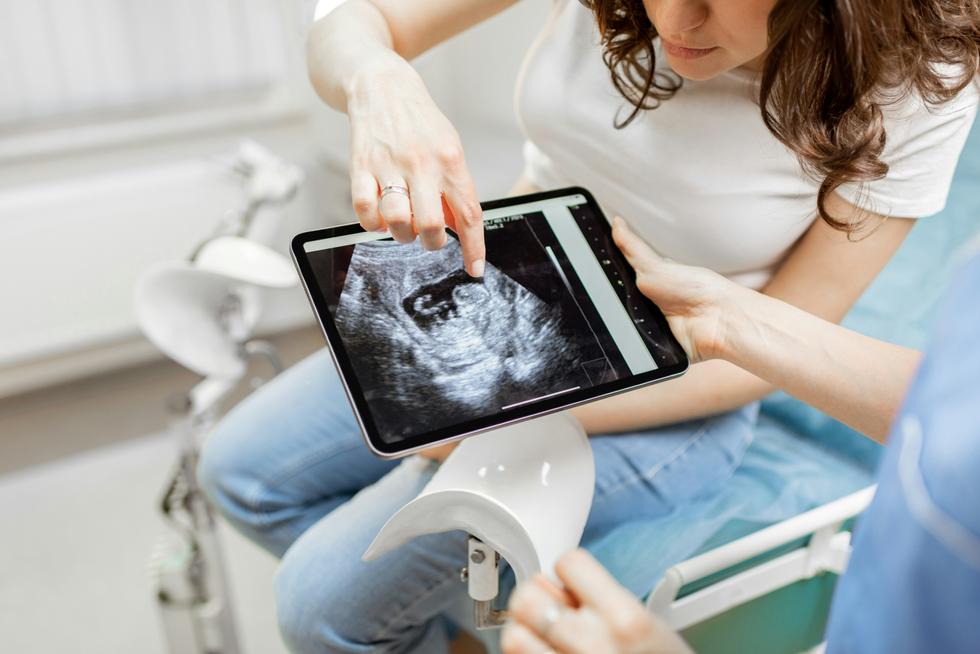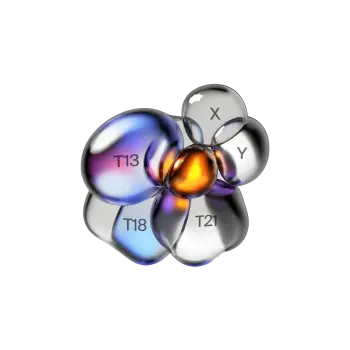Quick version
NIPT is a blood test used to detect chromosomal abnormalities such as Down syndrome at an early stage. It is non-invasive and poses no risk of miscarriage.
What is NIPT?NIPT analyzes the fetus's DNA from the mother's blood to detect chromosomal abnormalities.
The difference between KUB and NIPTKUB combines ultrasound and a blood test, while NIPT directly analyzes the fetus's DNA with higher accuracy.
NIPT for free?Women with increased risk after KUB or previous chromosomal abnormalities are offered NIPT free of charge.
What should I consider?Discuss the test with your doctor and be prepared for results that may require further testing.
What is a NIPT test?
NIPT stands for Non-invasive Prenatal Testing and is a blood test taken from the pregnant woman to detect chromosomal abnormalities at an early stage. The blood test can first be performed after pregnancy week 10+0 and analyzes small fragments of the fetus's DNA found in the mother's bloodstream to determine if the fetus has Down syndrome trisomy 21, Edwards syndrome trisomy 18, and Patau syndrome trisomy 13.
How does the NIPT test work?
NIPT uses advanced DNA sequencing technology, enabling the detection of chromosomal abnormalities with high accuracy. Since the test only requires a blood sample from the mother, it is completely non-invasive and poses no risk of miscarriage, unlike more invasive tests such as amniocentesis or chorionic villus sampling.
As a pregnant woman, you can book an appointment for blood sampling after week 10+0. If you have not received a referral from a doctor, you will need to pay for the NIPT test yourself.
KUB or NIPT, what is the difference?
Both KUB (Combined Ultrasound and Biochemistry) and NIPT are used to assess the presence of chromosomal abnormalities during pregnancy, but there are important differences between them. The KUB test combines a blood test from the mother with an ultrasound that measures the fetal nuchal translucency. This provides an estimate of chromosomal abnormalities and has an accuracy of about 90%. KUB is offered free of charge in Swedish public healthcare and is a standard test for all pregnant women.
NIPT is a more advanced test where the fetus's DNA is analyzed directly from a blood sample from the mother. It has a much higher accuracy, over 99%, and can detect specific chromosomal abnormalities. NIPT is non-invasive and carries no risk of miscarriage, but it is only offered free of charge to women with a high risk of chromosomal abnormalities, such as after a KUB test with a high likelihood of abnormalities or if there are other medical reasons.
Who is eligible for NIPT in Sweden?
All pregnant women in Sweden have the option to take a NIPT test, but only a few are offered the test free of charge through public healthcare. This mainly applies to women who have an increased risk of chromosomal abnormalities, such as Down syndrome. Women who do not meet these criteria can still undergo NIPT;
- Increased risk after KUB test If the KUB test shows an increased likelihood of chromosomal abnormalities, NIPT can be offered free of charge as a follow-up test.
- Previous pregnancies with chromosomal abnormalities If a previous pregnancy resulted in chromosomal abnormalities, NIPT can be offered to provide more information in a new pregnancy.
- Genetic diseases Women with genetic diseases or if chromosomal abnormalities run in the family, increasing the risk of developing chromosomal abnormalities, may also be offered NIPT free of charge.
For women who do not belong to these groups, NIPT can be done through private clinics for a fee, and no specific risk assessment is required to take the test.
Advantages of the NIPT test
NIPT has become a popular option for expectant parents who want early and accurate information about the fetus's health. Here are some of the main advantages of the NIPT test:
- Safety: Since it only requires a simple blood sample from the mother, there is no risk to the fetus, unlike more invasive tests such as amniocentesis or chorionic villus sampling.
- Early detection: The test can be performed as early as week 10 of pregnancy, providing early information about potential chromosomal abnormalities.
- Accuracy: NIPT is highly precise, with over 99% accuracy in detecting Down syndrome (trisomy 21), trisomy 18, and trisomy 13.
- Reduced anxiety: By receiving early and reliable information about the fetus's health, parents can experience reduced anxiety and stress during pregnancy.
Disadvantages of the NIPT test
Despite the many advantages, there are also some drawbacks to consider before taking a NIPT test:
- High cost: NIPT is not offered to everyone, and for those not in a risk group, the test can be expensive.
- Limited coverage: NIPT mainly focuses on the most common chromosomal abnormalities and does not detect all genetic or structural abnormalities that may occur.
- False-positive or false-negative results: Although NIPT is highly accurate, there is a small risk of false-positive or false-negative results, which can cause anxiety or lead to additional tests such as amniocentesis.
- Not diagnostic: NIPT is a screening test and not a diagnostic test. If an abnormality is detected, more invasive tests, such as amniocentesis, must be performed to confirm the result.
Ethical considerations with NIPT
Taking a NIPT test can raise ethical and emotional questions for expectant parents, especially if the test shows an increased risk of chromosomal abnormalities. It is important to understand that NIPT provides information early in the pregnancy, which can allow time for further decisions and preparations. For some, the result may lead to difficult considerations regarding future care and pregnancy decisions. Therefore, it is important to discuss the test results with a genetic counselor or doctor, who can provide support and guidance based on medical and personal circumstances. Being aware of these aspects before taking the test can help parents feel more prepared regardless of the outcome.
Practical advice when considering a NIPT test
Considering a NIPT test involves taking both medical and personal factors into account. Discuss with your midwife or doctor whether NIPT is the right choice for you based on your medical history and personal preferences. Be prepared for the fact that the results may require further tests for confirmation. Discuss what different outcomes may mean with your healthcare provider. Understand that you have options when it comes to prenatal diagnostics, and choose the method that best suits your needs and values. Regardless of what you choose, it is important that you feel confident and secure in your decision, with the support of your partner, family, the right information, and professional guidance.





















